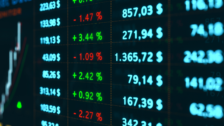‘Buy the dip’ sees record ETF inflows
Australia’s exchange-traded fund sector continued its stellar recent run, with record inflows of $2.9 billion in September 2021. Issuer BetaShares’ Australian ETF review report shows a sector of the market in strong health despite increasing volatility.
Record inflows were just enough to see assets under management increase, albeit only slightly, for the month, but posted 76 per cent growth over the last year. At present, the sector sits at a valuation of over $125 billion. That’s impressive on its own, but it’s worth giving context to the fact that both Magellan and relative newcomer GQG Partners manage a similar amount in actively managed strategies.
It was a quieter month for issuance, with Janus Henderson’s Global Sustainable Equity ETF (ASX: FUTR) the only addition to the growing pool of options. Not unexpectedly, the top performers were the cohort of negatively correlated so-called ‘bear funds,’ which deliver inverse returns to the market, in some cases leveraging them for additional exposure.
ETF Securities’ Ultra Short Nasdaq 100 (ASX:SNAS) gained 14 per cent, with BetaShares’ Strong Bear Fund (ASX:BBUS) delivering a similar result, up 11 per cent. However, as we have seen in recent years, market weakness generally tends to be short-lived, meaning these are best used as portfolio tools rather than long-term holdings.
Another undercurrent of the report may well be the growing popularity of investment platforms and managed accounts. These are favoured by advisers due to the ease of implementation for their clients. This may well have been a key driver behind a further $361 million being invested into BetaShares Cash ETF (ASX:AAA) with many seeking to rebalance portfolios while remaining fully invested.
Similarly, the most popular ETFs are those that offer a ‘core’ market exposure to the S&P500 or S&P/ASX200. Investors are increasingly using these low-cost passive exposures as a base on which to build more targeted, actively managed portfolios at a competitive cost.
Despite the recent weakness, which saw Magellan lose some $289 million from its core global strategies, the group remains the largest ETF by far, at $14 billion, after being an early adopter of the strategy.











